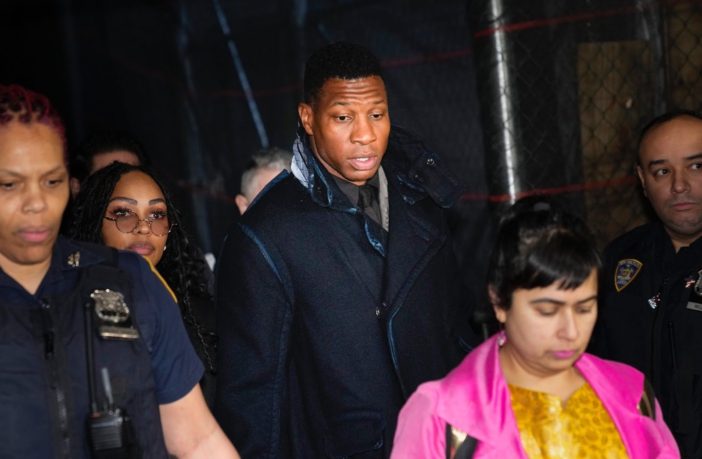In a society that claims to be just and unbiased, the recent conviction of actor Jonathan Majors for assault raises disconcerting questions about the enduring impact of racial prejudice within our legal system. From the moment he walked into the courtroom, Majors was burdened by a biased perception that seemed to overshadow the pursuit of justice.
A Manhattan jury recently found the 34-year-old Majors guilty of one misdemeanor assault charge and one harassment violation for a March altercation with his then-girlfriend Grace Jabbari, who is white.
The troubling narrative begins with the prejudiced lens through which the jury viewed Majors—a big Black man accused of harming a white woman. In a justice system supposedly built on the principles of fairness and impartiality, it is deeply disheartening to witness how racial stereotypes can infiltrate the courtroom, clouding the judgment of those tasked with upholding the law.
Majors, known for his talent and presence in the entertainment industry, found himself ensnared in a situation where the color of his skin seemed to overshadow his individual character. The implicit bias that often accompanies the intersection of race and crime played a decisive role in shaping perceptions from the outset, setting the stage for an uphill battle for justice.
It is essential to recognize that this is not an isolated incident. The sordid history of America reveals a disturbing pattern of crucifying Black men, particularly when allegations involve harm to a white woman. This historical precedent casts a long and haunting shadow over the pursuit of justice, perpetuating systemic inequalities that should have no place in a modern, enlightened society.
The courtroom dynamics further amplified these biases as Majors faced the daunting challenge of navigating a legal system that has too often failed to acknowledge the unique struggles faced by Black defendants. The power dynamics at play, with a white victim testifying against a Black defendant, can trigger deeply ingrained prejudices that compromise the objectivity we expect from our justice system.
This case serves as a stark reminder that we must confront and dismantle the pervasive racial biases that persist in our legal institutions. It is not just about one individual’s innocence or guilt; it is about addressing the deeply entrenched inequalities that continue to plague our society, perpetuating a cycle of injustice that undermines the very principles our legal system is meant to uphold.
As we reflect on the conviction of Jonathan Majors, we must renew our commitment to fostering a justice system that is blind to the color of one’s skin, where every individual is afforded the same rights and opportunities. Only by confronting and dismantling the systemic biases that have stained our history can we hope to build a future where justice is truly blind and impartial.
Journalist Lauren Victoria Burke sums it up best in this video.

Kicked to the curb
Marvel had more riding on Jonathan Majors than perhaps any other actor. Now it’s parting ways with him, and throwing years of plans for its cinematic universe in disarray. Marvel Studios and the Walt Disney Co. dropped Majors from all future projects following the actor’s conviction for assault and harassment on Monday, according to a person close to the studio who spoke on condition of anonymity because he wasn’t authorized to speak publicly on the matter.
The swift move by Disney marked a stunning about-face for an actor who had been one of Hollywood’s fastest-rising stars. Majors, who was acquitted of a different assault charge and of aggravated harassment, will be sentenced on Feb. 6. He declined to comment as he left the courthouse. Majors’ attorney, Priya Chaudhry, said in a statement that “It is clear that the jury did not believe Grace Jabbari’s story of what happened in the SUV because they found that Mr. Majors did not intentionally cause any injuries to her.”
“Mr. Majors still has faith in the process and looks forward to fully clearing his name,” said Chaudhry.
As the superhero studio prepared phase five of the Marvel Cinematic Universe, it cast the highly acclaimed Majors as the antagonist Kang the Conqueror. The character was to span several films and series as the Marvel Cinematic Universe’s next-phase answer to Thanos, the villain of “Avengers: Endgame.”
Majors had already appeared in ” Ant-Man and the Wasp: Quantumania” and the first two seasons of “Loki.” He was to star in “Avengers: The Kang Dynasty,” dated for release in May 2026.
The future of “The Kang Dynasty” is now unclear. Disney declined to comment on whether it will recast the role of Kang or pivot in a new direction.
Whether Majors will rebound from this remains to be seen.



